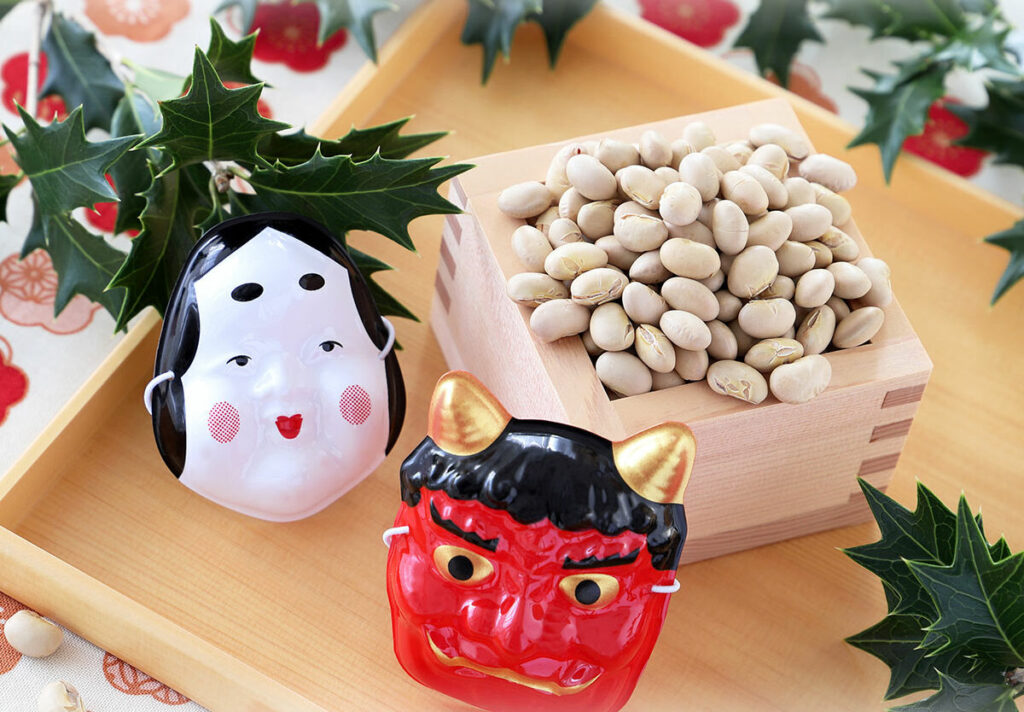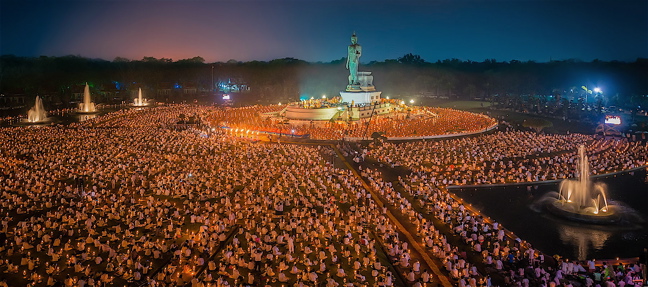In February, we acknowledge Setsubun, Isra’a and Miraj, Lunar New Year, Vasant Panchami, Nirvana Day and Shab-e Barat. Read more about each holiday/celebration below, written by members of our Inclusivity, Diversity, Equity and Accessibility (IDEA) Committee.
Setsubun: February 3

Setsubun (節分), meaning “seasonal division,” is a traditional Japanese festival celebrated on February 3, 2024, to welcome the arrival of spring according to the Japanese lunar calendar. The festival includes the ritual of Mamemaki, a tradition of throwing roasted soybeans to drive away evil spirits and invite good fortune. While throwing the soybeans, individuals shout, “Oni wa soto! Fuku wa uchi!” (“Devils out, happiness in”) as a means of purifying your space and minds. Although some customs are no longer popular during Setsubun, few people continue to traditionally ornament their homes with fish heads and holy tree leaves at their entrances to deter evil spirits from entering. This ritual symbolizes purification and is a lively family activity that emphasizes unity and tradition. Setsubun holds cultural and spiritual significance, marking the seasonal transition and creating a sense of harmony with nature.
Isra’a and Miraj: February 8 (depends on moon sighting)
Isra’a and Miraj commemorate the miraculous night journey and ascension of Prophet Muhammad. He travelled from Makkah’s Masjid Al-Haram to Jerusalem’s Masjid Al-Aqsa, then ascended to the heavens. The journey had two phases – terrestrial and celestial. Prophet Muhammad travelled on the Buraq to Jerusalem, a celestial steed that symbolizes the extraordinary nature of the Prophet’s journey. During this ascent, he met various prophets, including Abraham, Moses, and Jesus, and was shown the signs of God. It is said that during this part of the journey, the five daily Islamic prayers were ordained, marking a fundamental practice in Islam.
While he did not see Allah (God in Arabic), the Prophet’s proximity during this journey was unparalleled. The Prophet received the last verses of Surah Al-Baqarah and a promise of forgiveness for his Ummah, barring those associating partners with Allah. The journey included views of Paradise (Jannah) and Hell (Jahannum), revealing the rewards and punishments awaiting in the afterlife. After returning to Mecca, the Prophet’s detailed description of Masjid Al-Aqsa amazed the disbelievers, yet they remained skeptical. This night represents a pivotal moment in Islamic history, embodying deep spiritual significance and lessons in faith, resilience, and devotion.
Lunar New Year: February 10

Lunar New Year, known as the Spring Festival or Chinese New Year, is a significant celebration in China and among Chinese communities globally, spanning a two-week period. Rooted in a tradition over 3,000 years old, it marks the lunisolar calendar’s commencement with family reunions, feasting and symbolic rituals like cleansing homes to remove lingering bad luck. The celebration includes unique customs such as exchanging red envelopes filled with money, particularly for unmarried adults and children. Specific days hold special significance, such as honouring ancestors and acknowledging the creation of human beings. The festivities culminate with the Lantern Festival, a vibrant spectacle featuring paper lanterns, lion dances and parades, symbolizing cultural heritage and expressing hopes for prosperity and happiness in the new year.
Did you know that 2024 is the Year of the Dragon? Every Lunar New Year corresponds with a creature from the Chinese zodiac, which consists of a dozen creatures based on a 12-year cycle. Lunar New Year 2024 is the Year of the Dragon (or Wood Dragon), the fifth sign in the Chinese zodiac calendar. Dragon people are said to be confident, independent, charismatic, ambitious, adventurous and fearless.
Vasant Panchami: February 14
Vasant Panchami is a famous festival that marks the end of the winter season and ushers in the springtime. Sarasvati is the Hindu goddess of the Vasant Panchami festival. Sarasvati is the goddess of wisdom. She embodies the different facets of learning, such as the sciences, arts, crafts and skills. She is often pictured seated on a lotus or a peacock, wearing a white dress. Many honour the Goddess Saraswati by waking up early and dressing in yellow (believed to be her favourite colour), eating and sharing yellow sweets and snacks, and performing rituals (puja) to her deity.
Nirvana Day: February 15

Nirvana Day celebrated annually on February 15, holds significant importance in the Buddhist tradition as it commemorates the death of Buddha and his attainment of Nirvana. Buddhists believe in rebirth, meaning that all people are born again and again. During the Buddha’s life, he became enlightened, which means he understood the true nature of everything. So, when he died, he achieved complete Nirvana, which means he was free from ever being reborn again.
On Nirvana Day, Buddhists go to a temple or monastery and reflect deeply on the teachings of Buddha. People may engage in meditation sessions, participate in rituals, and engage in acts of charity and kindness to honour the Buddha’s teachings and legacy. It is also a time to think about impermanence, which means that we remember that people and things are precious, but they do not last forever, so we should enjoy them while we can.
Shab-e Barat: February 25 (depends on moon sighting)
Celebrated on the 15th of Shaban, Shab-e Barat, or the Night of Forgiveness, is a significant Islamic festival. On this night, Muslims worldwide ask forgiveness for their sins from the all-merciful Allah (God in Arabic). Additionally, the night can be used to seek mercy for the deceased and ill family members. It is believed that Allah decides the fortune and the future of every creature of the earth on this night. Muslims across the world celebrate the night differently depending on cultural diversity and local traditions.
Check out more Grandview Kids articles
- Celebrating Ahaana: Finding sound, strength and community on Cochlear Implant Day
- Navigating the intersection of disability and race as a caregiver: Honouring Black History Month
- Embracing hope through every challenge: Brock’s journey
- Jack’s resilience shines through every step: Rare Disease Day
- February: Dates of Significance
